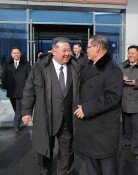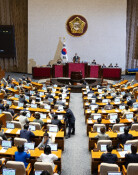Joint Chiefs Face Confirmation Hearings
Joint Chiefs Face Confirmation Hearings
Posted November. 30, 2005 07:19,
It was reported yesterday that the Ministry of National Defense revised related articles in the basic bill on national defense reform in a bid to make the president appoint not only the Chairman of the Joint Chiefs of Staff, but also the Army Chief of Staff, Chief of Naval Operations and the Air Force Chief of Staff through National Assemblys confirmation hearings when a personnel reshuffling of the militarys top officers is conducted next year.
Consequently, the National Defense Ministrys plan to seek to civilianize itself, which is included as a key subject in the national defense reform bill, is likely to gain momentum. However, controversy is expected because some within the military organization oppose this, insisting that requiring the militarys top officers to go through National Assembly confirmation hearings could mar the independence of the military.
According to a military source, during a Cabinet meeting presided over by President Roh Moo-hyun yesterday, participants decided to include not only the Chairman of the Joint Chiefs of Staff but also the Army Chief of Staff, the Chief of Naval Operations, the Air Force Chief of Staff, and the Defense Procurement Office head (at the vice minister level) to the National Assemblys confirmation hearing list by revising the eighth article related to National Assemblys confirmation hearings on key military officers in the basic bill on national defense reform.
According to the bill, which the National Defense Ministry made public on October 24, only the Chairman of Joint Chiefs of Staff was the subject to a National Assemblys confirmation hearing, and for Army Chief of Staff, Chief of Naval Operations, Air Force Chief of Staff and Defense Procurement Office head, the president can ask the National Assembly to conduct a confirmation hearing, if needed.
At the time, the National Defense Ministry drew up the bill to only include the Chairman of the Joint Chiefs of Staff on the National Assembly confirmation hearing list, taking into account any possible backlash from the military. However, after the ministry announced the bill, the related article was reportedly revised on the judgment that there should be no exception on personnel shifts of military top level officers in the process of the government deliberating the bill for enacting it.
It seems that the governments judgment is that it is necessary to expand the subject of National Assemblys confirmation hearings on key military officers in order to expedite the civilianization of the military organization, said a military official.
However, some within the military are raising concerns that if militarys top level officers, who have been inspected by the ministry for a long time, are included in the National Assemblys confirmation hearing list, it might undermine the political neutrality of the military. In addition, some pointed out that if candidates are disqualified for a designated post in a National Assemblys confirmation hearing and failed to be promoted, it might deal a considerable blow to the leadership of the military organization.
As far as I know, some from the army, navy, and air force strongly opposed revising the related bill due to this reason, said another military official.
The National Defense Ministry plans to submit this bill to this National Assemblys regular session, but ruling and opposition parties are likely to be at loggerheads over whether to expand the subject of the National Assemblys confirmation hearing list on key military officers.
Sang-Ho Yun ysh1005@donga.com







